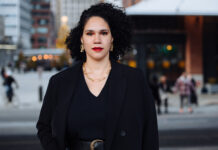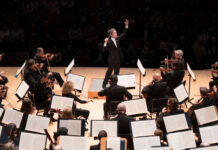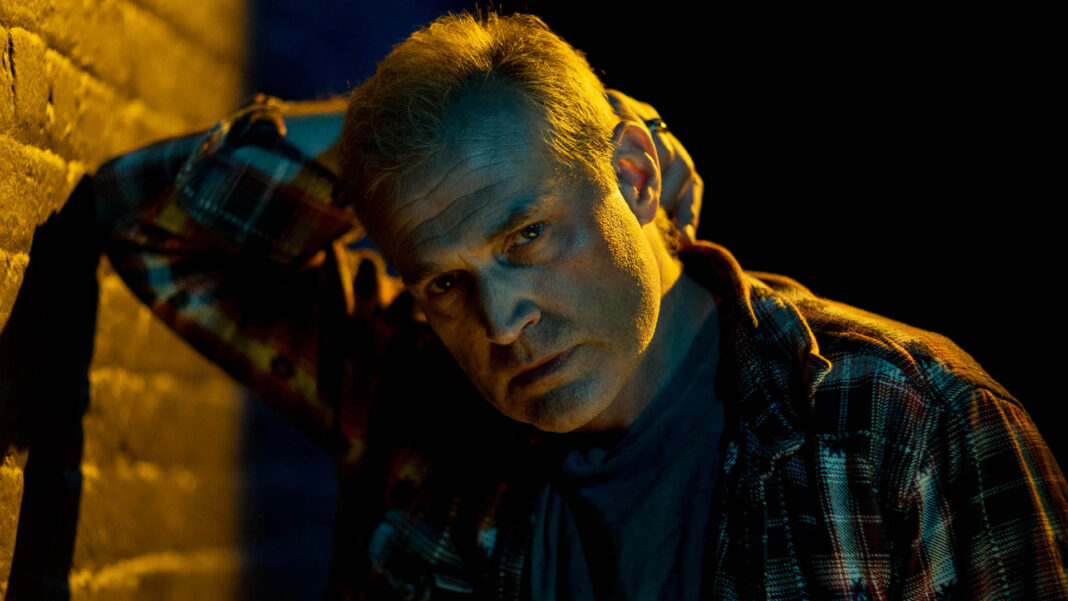For anyone who has seen musicals on Broadway for the last nearly 25 years, you are certain to have seen Marc Kudisch in one of my many roles: Jackie in The Wild Party; Jeff Moss in a revival of Bells Are Ringing; Trevor Graydon in Thoroughly Modern Millie; Proprietor in the first Broadway production of Assassins; Baron Bomburst in Chitty Chitty Bang Bang; Franklin Hart Jr., in 9 to 5 and most recently as Mr. Burke in Girl From the North Country.
Kudisch has also spent considerable time in operas and shows that are more operatic in nature. He appeared in David Lang’s Anatomy Theater, Ricky Ian Gordon‘s Sycamore Trees and Michael John LaChiusa‘s See What I Want to See. This week he will return to the role of The Older Man in Emma O’Halloran and Mark O’Halloran‘s one-act opera Trade. LA Opera is presenting Trade along with the O’Halloran’s Mary Motorhead at REDCAT in Los Angeles from April 27th – April 30th.
In Trade, Kudisch’s character spends the opera with The Younger Man (Kyle Bielfield) who is a rent boy. Their intimacy is not physical, but rather emotional. Both characters pursue a naked honesty that has nothing to do with sex.
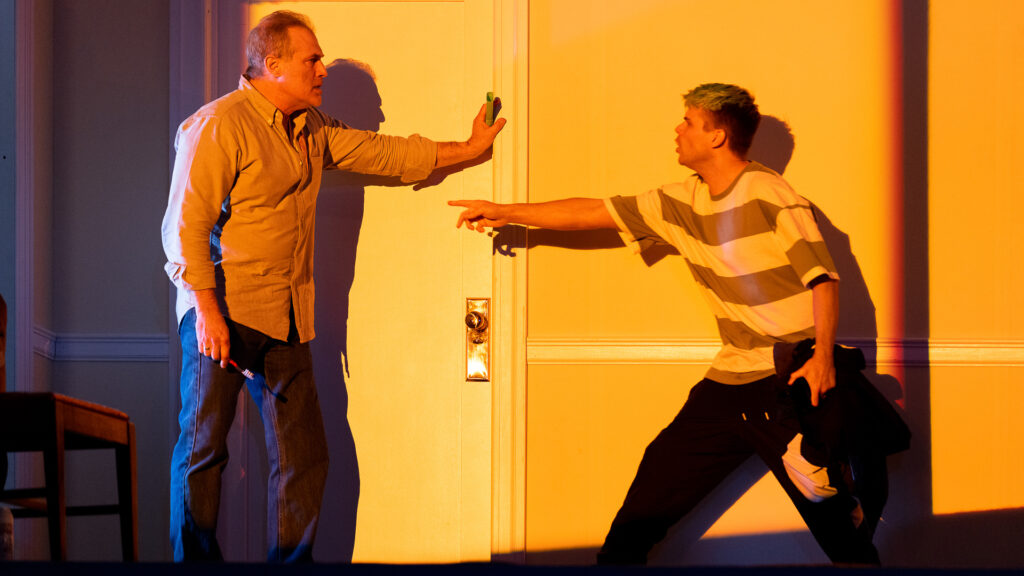
In early March I spoke with Kudisch about his passion for the kind of stories that are told on opera stages and how that work is different than what he does on Broadway. We also talk about the power of music when words fail and the self-imposed prisons we all put ourselves in…just like his character in Trade. What follows are excerpts from our conversation that have been edited for length and clarity. To see the full interview, please go to our YouTube channel.
You told Stage Buddy in 2017, that as a performer, “I’m not interested in adulation. I’m in it for the conversation. I say yes to projects where I can be there to see how the audience receives it.” What was it about the conversation that Trade offers that made you say yes even before it was completely written?
First of all, I love the music. I just liked what Emma was writing in terms of a sonic environment. From that, I knew that it was going to be an uneasy conversation on the course of the night. Even in the aria. The first thing that we did was we polished and recorded at least the older man’s aria. That happened during the pandemic.
I liked the idea of someone who lacks the skill set of expression. I think that in many ways it is metaphorical for where we are right now. There are a lot of people out there who lack the skill set to truly express themselves. But I think some of us are trying very hard to do so.
This is a man who seems to be stumbling towards honesty by the end of by the end of the piece, which sounds like an intriguing arc for any actor to play.
I like stuff that’s honest, right? Engaging to me is just being honest. Not apologizing. Not trying to put a bow on anything because that’s not on us – not in today’s world. More often than not, when things get musicalized, they get romanticized because obviously music is a heightened state. When words aren’t enough, that’s when music kicks in. But also it’s about the heart, the senses opening up, even in the hardest or most challenging conditions.
For this man, like for me, I just look for hope. I don’t need a happy ending. I don’t want a happy ending. I want hope. That’s the thing that I think is so cathartic about the piece. The older man, frankly the younger man, by opening themselves up, by even just acknowledging their situation and trying to talk about it, there’s hope for an actual conversation to go beyond where they are now. That’s real and that’s moving. Because you can actually believe that other people of that ilk might want to, or after this attempt, communicate beyond where they’ve been. It’s what we’ve got to do.
I had an opportunity to speak to Mark and Emma prior to the world premiere of Trade at Prototype. Mark said that he believes that at the end of Trade the older man has hit bottom. Mark doesn’t know if he moves up from there or not. What are your thoughts about where he might go after this, or is that even important to you?
It’s not important to me because I have to play the moment. I play the event and I play the event moment to moment to moment to moment. It is incredibly important to the audience. If we do our job right that will be the conversation over dinner and then over breakfast the next day and then over a cup of coffee three weeks later. My responsibility is not to that. That’s the audience’s responsibility. My responsibility is not to judge.
My last Broadway show before working on this opera [Girl From the North Country], was again with an Irish playwright/director: Conor McPherson. [I was] playing a man that was not dissimilar in terms of where he was in his life and the decisions that he was making. And I loved that. I love in Irish literature that there’s a real exploration of men in intense circumstance. I can only speak from the male point of view, I don’t know where he ends up. I mean, I have my ideas of what possibly happens. But for sure, it’s weird. He hits bottom. But in hitting bottom he is at his best now.
And he’s found a moment of truth.
100% He achieved what he set out to do. It may have not have gone the way that he wanted it to, clearly. But he actually achieved what he set out to do. And that to me is a lot. Again, this is a piece that’s maybe not meant to have completion for him, but who knows who’s sitting in the audience.
It doesn’t even have a completion for Mark. He wrote the play he adapted for the libretto.
It’s a beautiful play and I always stayed focused on the play. What I love about the piece is that when Mark saw the opera, he saw a whole different play that he had never even realized before. Which was really sort of wonderful to see on his face when he saw it for the first time.
I love the opera of it. We’re talking about modern opera which I am a huge fan of. The same way that when I first discovered musical theater, I feel the same way about modern opera right now. Frankly, it’s far more interesting to me than anything on Broadway, because it’s sort of like when I first got to New York and I was doing theater. That was what we were doing. It feels like opera’s picked up those reins and has taken the reins and is moving forward in that direction.
I’ve seen you in The Wild Party. I saw you in Thoroughly Modern Millie. I saw you in A Little Night Music. I saw you in Assassins. I saw you in 9 to 5. But the show I saw you in that seems to have as much to offer you as an actor in parallel to what you do in Anatomy Theater or in Trade is actually See What I Want to See.
I wish you would have seen Girl From the North Country, which was my last Broadway show by Conor, which is a spectacular piece of theater and truly a play with music as opposed to musical. You would never forget it once you’ve seen it.
I loved See What I Want To See. First of all, I have such a long relationship with Michael John LaChiusa. Also I did an incredible piece for him down in Washington and never got to New York called The Highest Yellow, which was about Vincent van Gough, which was also spectacular. Michael John writes music theater aria. I don’t know why he hasn’t written more opera. He should. I keep poking at him to do it. That’s my longest relationship in terms of working relationship. His writing is incredible.
See What I Want to See is incredible. There’s an aria that I sing called Central Park and it is an aria. It’s one of my favorite things that I’ve ever created. It’s one of the things I’m most proud of. It was a real collaboration with Michael John and I and it took a while to find it. But once we found it, there’s nothing else like it.
Do projects like Anatomy Theater and Trade challenge you vocally in different ways than other shows that you’ve done?
Yeah. I’m more interested in the intent. The truth is given where they both vocally sit, for me they’re not vocally taxing. It’s the intention that is the joy and the fun. I am classically a cavalier baritone. That is genuinely what I am. But for whatever the reason is, in most of the modern opera work that I do, I’m a bass baritone. That’s because, I guess, of the character or the intention of the character. So I’ve practiced my voice in that space. In some ways it becomes challenging because you almost have to re-register yourself. It’s hard to describe.
Because I work in so many different mediums and vernaculars of music, I have to keep my voice flexible. If I’m singing a pop score I place it in one place. If I’m singing a Broadway score, because it’s eight shows a week now, you cannot sing operatically eight shows a week. I don’t care who you are. So it has to be placed that way. If I’m singing something like Anatomy Theater or I’m singing something like Trade, then I have to place it here. I just have to constantly think because I have to keep flexible.
In Anatomy Theatre there are moments where I wanted it to be nasal and shrill and harsh to play with the audience, to mess with them.
In an opera that’s already messing with the audience anyway.
I love it so much because it is a dangerous piece. I want us to do it again. I think we’ve gone through this period of time where it was just too sensitive. But I think we’re back at a period of time where I find it to be very necessary. But yeah, it’s subversive. Especially my character just beats you. Beats you with your own judgment.
In Trade it’s the opposite. We don’t come to you. You come to us. Trade is very much, even though it is an opera, it is very much a play, which I think is what is fascinating about the piece. It’s what I really love about the piece. It is not presentational. It is them reaching out, trying to communicate to the other. It thrashes at times and it’s super quiet at times. And again there are moments where I don’t want to sound pretty. It’s hard for this guy to say what he’s saying. If it was open and confident and beautiful the whole time that would be dishonest.
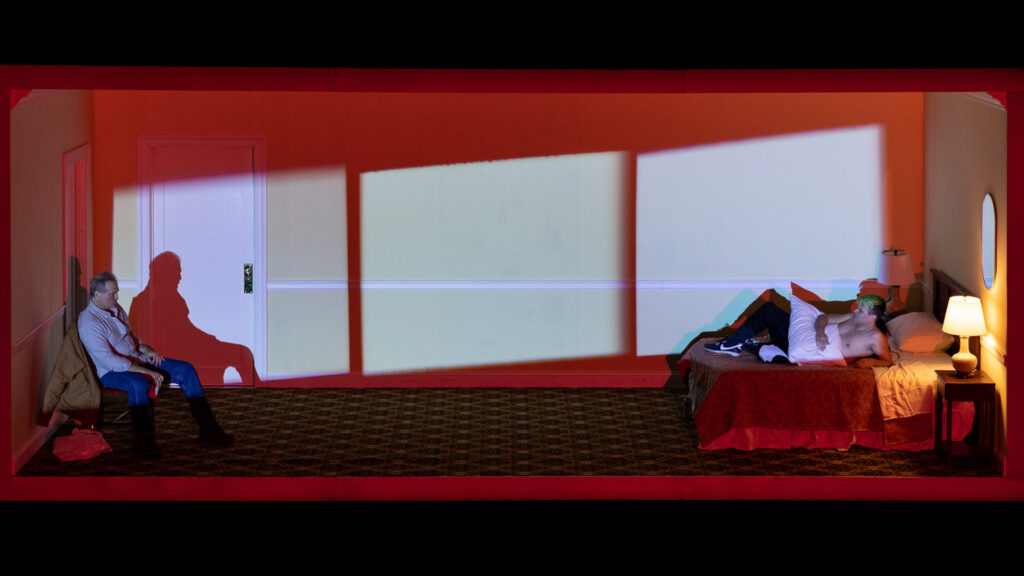
There are these brief phrases that each of these characters have. Then, particularly with the with the older man, all of a sudden he just spews his guts out. What Mark told me was that there’s a point where he these characters run out of words to say until it builds up and then suddenly everything comes to them. That’s got to be tremendous for you.
Oh, it is tremendous because it’s real. Look, acting is overrated. It just is. When I hear an actor say, “Oh, I pretend for a living,” it bothers me because I want to say, “Then you’re not a very good actor.” I don’t. I tell the truth. It’s not hard to tell the truth when what’s written on the page is truthful. And it’s also truthful, not just in its content, but in how the character sounds very much like that character. No one else should sound like that person. That’s when you know you’ve got something specific.
Sondheim said it all the time, and I think he stole it from Oscar Wilde, “The more specific you are, the more universal it becomes.” It’s a very specific play and because of that acting is not necessary. I just have to be with the character. Being a man of a certain age now, and having the amount of experience that I have in my life now, I don’t have to look far to relate to what the older man is going through. I just have to be in the play. With not only the play, but with the audience moment to moment to moment. That’s all we have to worry about. That’s all I have to think about.
Emma described the two pieces, Trade and Mary Motorhead, as being about people imprisoned in their own worlds. Characters like these prove endlessly fascinating for us as an audience. As somebody who gets to bring these stories and to characters to life, what is it about “people imprisoned in their own worlds” that is such a rich opportunity for you as an actor and compelling for you as a human being?
Because we are all people that are imprisoned. We are all people that are imprisoned in this novel of fiction that we write in our heads every day of our lives. There is not a soul walking the planet that has not formed some form of a cell or a box or a linear limitation of what the world is for them that they can, or allow themselves, to live in. Sometimes the cell is more literal than other times. That is why Mary Motorhead is so beautiful with ours.
Mary Motorhead is far more direct than our piece. You know, it’s a mono drama. Naomi just thrashes through that thing. It’s so fantastic. But interestingly, that is a character who is in prison and far freer human being than my character. [He’s] in his own prison, his own device of a prison. It’s a fascinating dichotomy. The two pieces could not be more polar opposite and yet more deeply connected.
I say it all the time: technology constantly changes, constantly advances. The human condition remains the same. Will always remain the same. Always. We will never change as human beings. We will never evolve in my opinion. So the best thing we can do to connect is to merely acknowledge that is who and what we are. Acknowledge our flaws. Acknowledge our foibles. Acknowledge our limitations. Acknowledge the cells we create for each other. Only then is there a conversation about opening the door and letting ourselves out.
To see the full interview with Marc Kudisch, please go here.
Photo: Mark Kudisch (Courtesy LA Opera)


